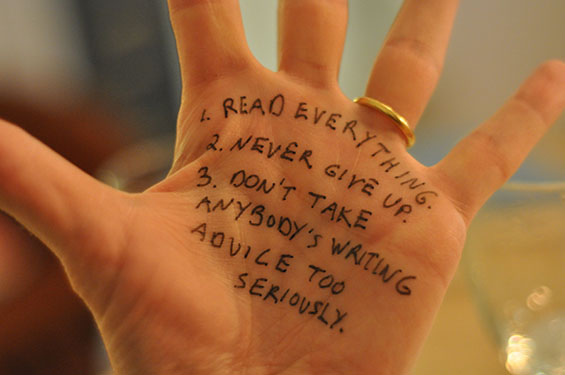
I recently discovered this lovely blog consisting of pictures of authors scribbling advice for aspiring writers on their hands. The authors are mainly fantasy authors, but even if you’re not into genre fiction, it’s a nice little boost of encouragement and inspiration.
Often, I hear people quoting famous authors on how to write. I wonder, though, who made these authors an (ahem) authority on writing. Yes, some of them have won awards, and, yes, some of them have sold many thousands of books. But in the end, perhaps we should take all this advice with a grain of salt.
Steven King urges writers to spend 16 hours churning out 15,000,000 words every day. John Steinbeck suggested writing letters to understand your beliefs. Ernest Hemingway created his iceberg theory of storytelling (and popularized getting blitzed as an attempt to beat writer’s block).
The problem, though, is that sometimes we lose our own voice by paying to much attention to the voices of others. Rather than write a story, we write a pale imitation of Vonnegut, a weak spectre of McCarthy, a cringe-inducing rip-off of Gibson. We limit our own creativity by trying to follow the example of others.
Neil Gaiman posted about this very topic on his blog. He recently discovered some of his notebooks from his teenage years, and what he saw made him wince a bit:
“[…] what amazed me was that there was almost nothing there that was written by me. I’d sound like e.e.cummings one moment and an awkward mash-up of Moorcock and Zelazny the next. You can tell exactly when I’ve been reading the complete poems of Rudyard Kipling… I could point to every poem, every unfinished fragment of prose in that folder, and tell you who I’d been reading, what I was thinking at the time. Everything read like a bad imitation of somebody else. There wasn’t anything in there that indicated that I was going to be a writer, a real writer, with something to say, except for one thing, and it was this:
I was writing. There was lots of writing going on.
And that made up for so much. I never knew how to finish anything longer than a couple of pages, but I was writing.
You want to be a writer?
Keep writing.”
I’m not saying that we should abandon all study of creative writing. Clearly, it’s helpful to experiment with new techniques and hone the craft of writing. But devotion to the “masters” of the trade and obsession with technique limits us. We focus so much on following someone’s example that we fail to create something that is our own.
William Faulkner, American hero and author extraordinaire, wrote that it was not until he ignored the pressures of peers, publishers, and past traditions that he was able to truly come into his own as a writer. When asked about how to write, he responded with an appropriately dismissive answer:
“Let the writer take up surgery or bricklaying if he is interested in technique. There is no mechanical way to get the writing done, no shortcut. The young writer would be a fool to follow a theory. Teach yourself by your own mistakes; people learn only by error. The good artist believes that nobody is good enough to give him advice. He has supreme vanity. No matter how much he admires the old writer, he wants to beat him.”
To me, this advice of ignoring advice is the best advice there is. Be inspired by your idols, be grateful for them. But when writing, do your best to beat them.
What do you think? Is there any advice on writing that has stuck with you?
Discover more from UCWbLing
Subscribe to get the latest posts sent to your email.


5 replies on “My Advice: Don’t Take Any Advice At All”
Neil Gaimen has one of my favorite quotations about incorporating feedback into the revision process that speaks to the value the UCWbL’s places on positioning ourselves as readers:
“Remember: When people tell you something’s wrong or doesn’t work for them, they are almost always right. When they tell you exactly what they think is wrong and how to fix it, they are almost always wrong” (from “10 Rules for Writing Fiction,” The Guardian).
Word.
http://uwbwritingcenter.wordpress.com/2013/01/15/beguiled-by-big-words/
I would offer one adjustment: The key is not to beat the masters, but instead to beat those who crowned the masters and locked the throne room doors. Do your own thing and make them realize that they forgot to leave the door open for you.
This is indicated by the phenomenon of students adjusting their style of writing to fit an instructor’s personal desires to attain a fair grade. I agree with the advice offered here and I will be sure to ignore it.